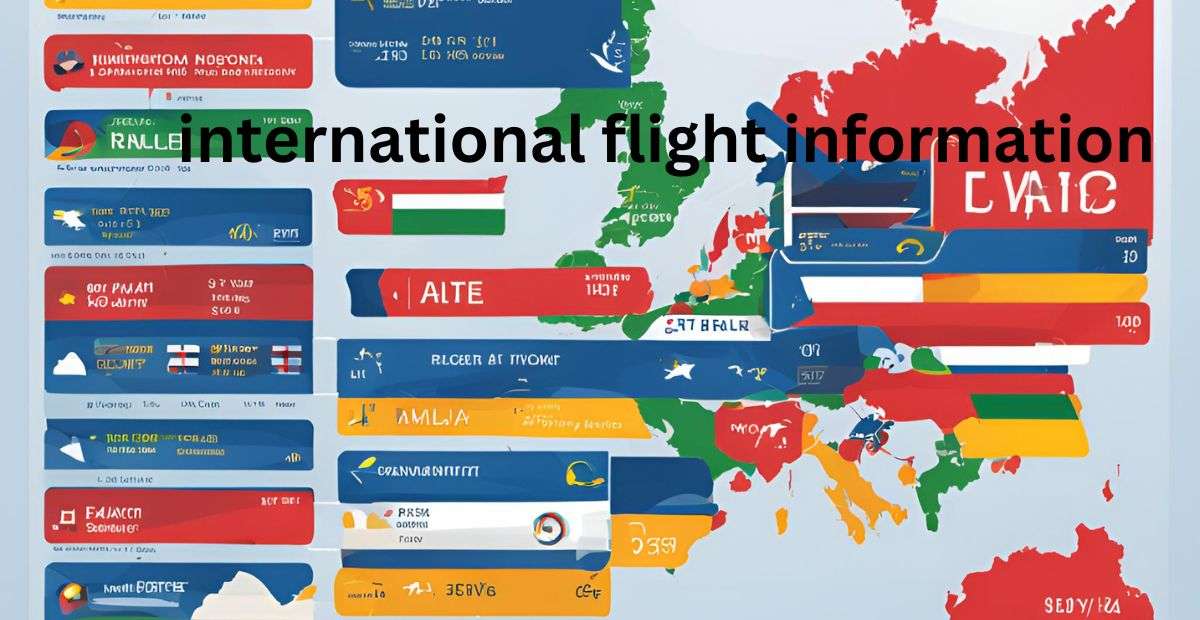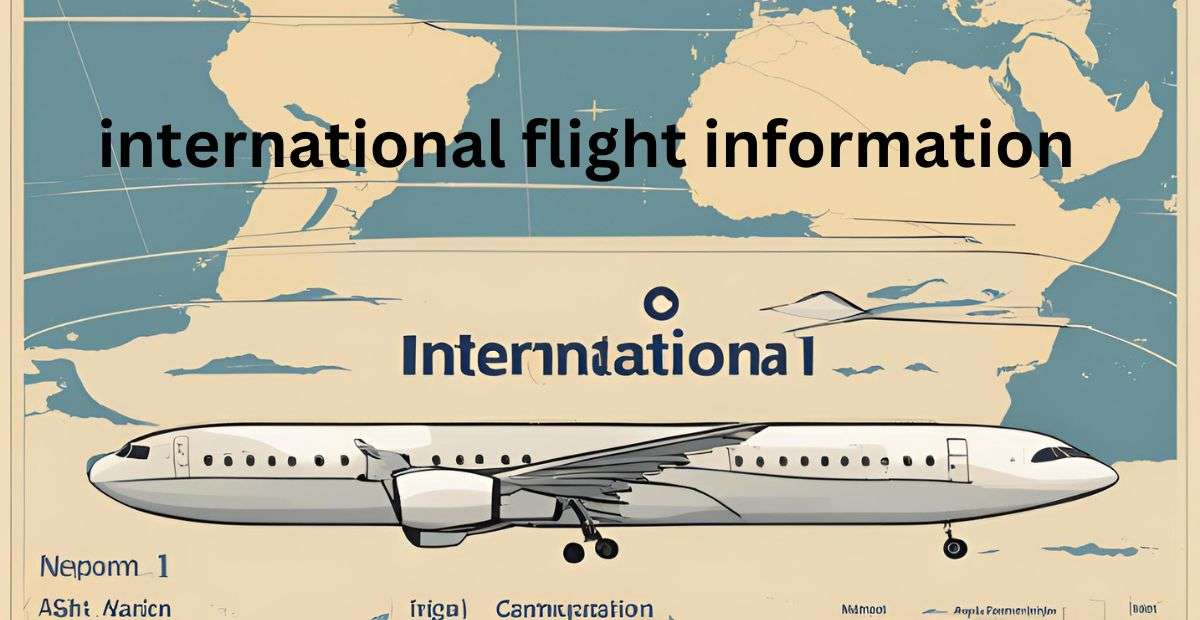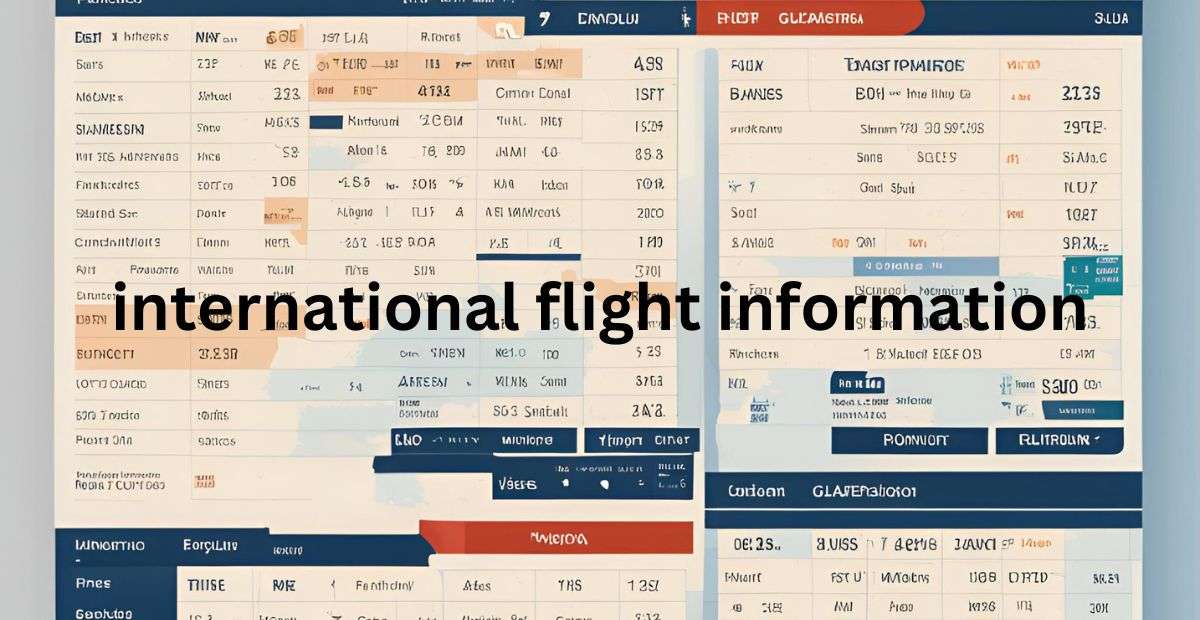Contents
- 1 International Flight Information
- 1.1 Day 1: Understanding International Flight Information
- 1.2 Day 2: Gathering Essential Flight Information
- 1.3 Day 3: Mastering Flight Tracking Tools
- 1.4 Day 4: Practical Tips to Manage Without Constant Flight Information
- 1.5 Day 5: Living without Frequent Updates
- 1.6 7.What do I need to know for an international flight?
- 1.7 9.What is international flight description?
- 1.8 10.What is allowed in a carry-on bag?
International Flight Information
- Introduction
In the modern age, staying updated with international flight information has become a norm for frequent travelers. However, constantly checking flight details can become overwhelming and stressful. Learning how to manage your travel without being glued to flight updates can enhance your travel experience and reduce stress. This guide will take you through a step-by-step process to help you quit the habit of constantly seeking international flight information in just five days.

Table of Contents
- Introduction
- Day 1: Understanding International Flight Information
- Overview of International Flights
- Importance of Flight Information
- Day 2: Gathering Essential Flight Information
- Checking Flight Schedules
- Understanding Airline Codes
- Reading Airport Codes
- Day 3: Mastering Flight Tracking Tools
- Flight Tracker Apps
- Airline Websites and Notifications
- Government and Regulatory Websites
- Day 4: Practical Tips to Manage Without Constant Flight Information
- Trusting Airline Alerts
- Using Local Resources
- Preparing for Delays and Cancellations
- Day 5: Living without Frequent Updates
- Psychological Preparation
- Focusing on the Essentials
- Alternative Sources of Information
- What do I need to know for an international flight?
- What information do you need to book an international flight?
- What is international flight description?
- What is allowed in a carry-on bag?
- Conclusion
Day 1: Understanding International Flight Information
Overview of International Flights
International flights connect different countries, allowing for travel across borders. These flights are operated by various airlines and are subject to international aviation regulations. Understanding the basics of international flights can help you feel more confident and reduce the need to constantly check flight information.
Importance of Flight Information
Flight information includes details such as departure and arrival times, gate numbers, delays, cancellations, and baggage information. Staying informed about these details ensures a smooth travel experience. However, relying too heavily on frequent updates can cause unnecessary stress.
Day 2: Gathering Essential Flight Information
Checking Flight Schedules
Flight schedules provide the planned departure and arrival times for flights. You can find these on airline websites, travel agencies, and airport websites. Familiarize yourself with these schedules in advance to reduce the need for last-minute checks.
Understanding Airline Codes
Airline codes are unique identifiers for airlines, consisting of two letters. For example, AA stands for American Airlines, and DL stands for Delta Airlines. Knowing these codes can help you quickly identify airlines and their flights without needing to delve deeper into flight information constantly.
Reading Airport Codes
Airport codes are three-letter codes assigned to airports. For instance, JFK stands for John F. Kennedy International Airport in New York, and LAX stands for Los Angeles International Airport. Recognizing these codes can make it easier to understand flight itineraries and reduce the need for frequent updates.
Day 3: Mastering Flight Tracking Tools
Flight Tracker Apps
Flight tracker apps provide real-time updates on flight status. Popular apps include FlightAware, FlightRadar24, and Plane Finder. While these tools are useful, learning to use them efficiently without becoming dependent on them is crucial.
Airline Websites and Notifications
Most airlines offer real-time updates and notifications through their websites and mobile apps. Signing up for notifications can help you stay informed about important changes without constantly checking for updates.
Government and Regulatory Websites
Websites such as the Federal Aviation Administration (FAA) and the Transportation Security Administration (TSA) provide information about regulations, security procedures, and travel advisories. Familiarize yourself with these resources to stay informed about any significant changes that might affect your travel plans.
Day 4: Practical Tips to Manage Without Constant Flight Information
Trusting Airline Alerts
Airlines are responsible for informing passengers about any significant changes, such as delays or cancellations. Trusting these alerts can reduce the need to constantly check flight information.
Using Local Resources
When at the airport, use local resources such as information desks and airport staff to get the latest updates. This can help you manage your travel without relying on online flight information.
Preparing for Delays and Cancellations
Delays and cancellations are common in air travel. Preparing for these situations in advance, such as having a backup plan or knowing your rights as a passenger, can help you handle them without constantly checking for updates.
Day 5: Living without Frequent Updates
Psychological Preparation
Psychological preparation is key to reducing dependency on constant flight updates. Accept that not everything is within your control and that overchecking can add to your stress.
Focusing on the Essentials
Focus on the essential information that you need for your travel. By concentrating on the key details, you can reduce the urge to check every minor update.
Alternative Sources of Information
Use alternative sources of information such as news outlets and social media to stay updated about any significant changes that might affect your travel plans.
7.What do I need to know for an international flight?
When preparing for an international flight, there are several key aspects to consider to ensure a smooth and stress-free journey. Here are the essential things you need to know:
Passport and Visas:
- Validity: Ensure your passport is valid for at least six months beyond your intended stay.
- Visas: Check if you need a visa for your destination country and apply well in advance.
Travel Insurance:
- Coverage: Purchase comprehensive travel insurance that includes medical coverage, trip cancellation, and lost luggage.
Health Requirements:
- Vaccinations: Check if any vaccinations or health certificates are required for your destination.
- Medications: Carry any necessary medications and a copy of your prescriptions.
Flight Details:
- Tickets: Confirm your flight bookings and keep a copy of your e-ticket.
- Baggage Allowance: Check the baggage allowance and pack accordingly to avoid extra fees.
Airport Procedures:
- Check-In: Arrive at the airport at least 3 hours before your flight for international check-in.
- Security: Be prepared for security checks and know the regulations for carry-on items.
Customs and Immigration:
- Documents: Have all necessary travel documents ready, including passport, visa, and boarding pass.
- Declarations: Be aware of any items that need to be declared upon arrival.
Currency and Payments:
- Local Currency: Obtain some local currency for immediate expenses upon arrival.
- Credit Cards: Inform your bank of your travel plans to avoid card blocks.
Accommodation and Transport:
- Reservations: Confirm your hotel bookings and have the address and contact details handy.
- Transport: Arrange for airport transfers or know the available transportation options at your destination.
Communication:
- Phone: Check international roaming plans with your mobile provider or consider a local SIM card.
- Emergency Contacts: Keep a list of emergency contacts and important numbers.
Travel Essentials:
- Packing List: Pack according to your destination’s weather and cultural norms.
- Electronics: Bring necessary chargers, adapters, and electronic devices.
Travel Alerts and Updates:
- Government Advisories: Check travel advisories and updates from your government.
- Flight Status: Monitor your flight status for any delays or changes.
Proper preparation for an international flight can significantly enhance your travel experience. Ensure your documents are in order, understand health and safety requirements, pack wisely, and stay informed about your flight and destination. This comprehensive approach will help you enjoy a smooth and enjoyable international journey.

8.What information do you need to book an international flight?
To book an international flight, you typically need the following information:
- Travel Dates: The dates you plan to depart and return.
- Departure and Destination Cities: Where you’re departing from and where you’re going.
- Passenger Details: Names as they appear on passports, birthdates, and contact information.
- Passport Information: Passport numbers, expiration dates, and issuing country.
- Preferred Seat Class: Economy, business, or first class.
- Special Requests: Such as meal preferences or seat preferences (aisle, window, etc.).
- Payment Information: Credit card details for booking and billing purposes.
Additionally, if you’re booking through a travel agent or website, they might require other details like frequent flyer numbers, special assistance requests, or visa information depending on your destination and nationality.
9.What is international flight description?
An international flight typically refers to a flight that travels between countries, crossing international borders. These flights are operated by airlines and connect passengers from one country to another, often spanning long distances and involving different time zones. International flights may vary in duration depending on the distance traveled, and they generally require passengers to comply with international travel regulations, including passport and visa requirements specific to each country visited. These flights can range from short-haul trips between neighboring countries to long-haul journeys across continents.
10.What is allowed in a carry-on bag?
The items allowed in a carry-on bag can vary slightly depending on the airline and country regulations, but generally, the following items are permitted:
- Personal Items: Such as wallets, keys, and small electronics like smartphones and tablets.
- Travel Documents: Passport, boarding pass, and any necessary visas or permits.
- Medication: Necessary medications and medical devices (ensure compliance with liquid restrictions).
- Electronics: Laptops, cameras, and other electronic devices (may need to be removed during security screening).
- Valuables: Jewelry, small electronics, and items of personal value.
- Essential Personal Care Items: Small amounts of liquids, gels, and aerosols under 100ml (3.4 ounces) each, which must fit in a single quart-sized (approximately one liter) clear plastic bag.
- Books and Magazines: Reading materials for the flight.
It’s essential to check specific airline and airport regulations, especially regarding liquid restrictions and any additional items that may be prohibited or require special handling.
11.Conclusion
Quitting the habit of constantly seeking international flight information can be challenging but achievable. By understanding flight information, using tracking tools efficiently, trusting airline alerts, and focusing on essential details, you can manage your travel effectively without being overwhelmed. This guide has provided a step-by-step process to help you quit the habit in just five days, allowing for a more relaxed and enjoyable travel experience.


Welcome to a blog full of valuable tips to help you organize your life. From time-saving hacks to motivational advice, there’s something for everyone here. The posts are designed to be simple and actionable, making it easy to get started on improving your daily routine. Whether you need ideas for staying on top of tasks or ways to stay focused, you’ll find useful tips that fit your lifestyle.
This is beyond exceptional—it’s a testament to what thoughtful and passionate writing can achieve! The sheer effort, clarity, and depth of insight in this piece are remarkable. It’s refreshing to read something that not only informs but also sparks curiosity and admiration. The way each point is structured creates a natural, engaging flow, making it impossible to stop reading. The expertise behind this shines through in every sentence, making it a truly impactful and inspiring work. Thank you for sharing such a brilliant creation.
Hi.
My name is Vicki. I’m a expert in placing content articles and texts on different internet pages.
I am looking into your website wandersurecoverage.com and I would like to learn about the rates and conditions for submitting articles. To ensure a convenient and prompt clarification of all details, I have prepared a questionnaire https://forms.gle/58NDRfrHg3RMdRcW7
It usually takes no longer than 3 mins but will make clear all the details of the project and accelerate every stage of your future partnership.
Thank you so much in advance for your time and I’m looking forward to a successful collaboration.
If you require any more details about the questionnaire or anything else, feel free to get in touch with me.
Thanks, Vicki
Hey there, love the design of wandersurecoverage.com.
A good friend of mine, a domain investor (web addresses), is auctioning off his entire .ai portfolio due to financial difficulties.
To be clear: all 80 premium domains, like setups.ai and units.ai (plural), are auctioning from $99—while the singular versions (setup.ai is $400k, unit.ai is $357k) are listed for hundreds of thousands by other investors.
It’s like a foreclosure auction for a house, but with domains and way more upside.
For example, he bought trademarks.ai last July for $160 and sold it in November for $2,997 – just by listing it on a marketplace like Sedo.com.
PS: If you’re interested, just click the big .ai banner on Sedo.com. Auction ends 26.09.